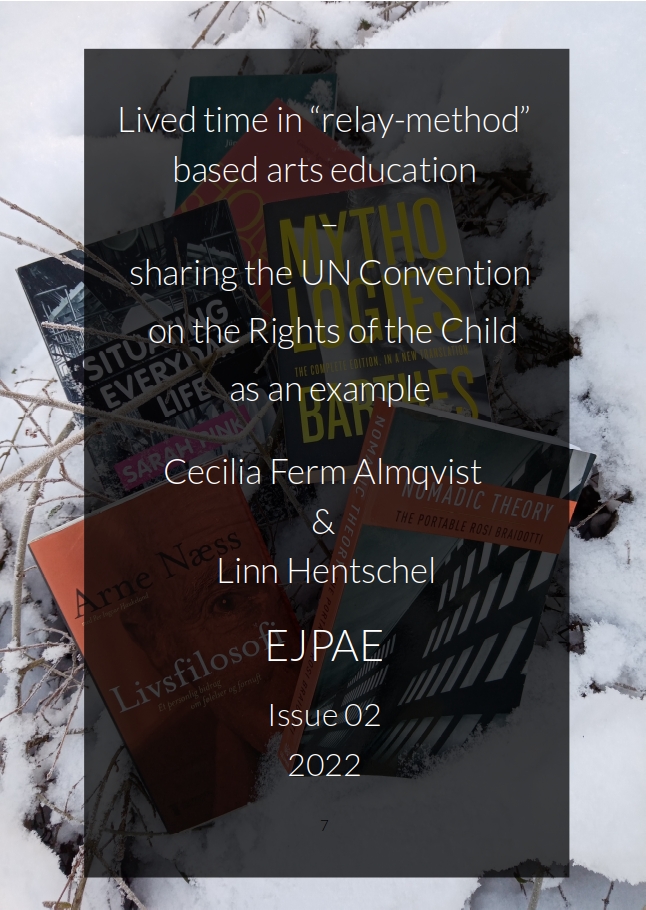Lived time in “relay-method” based arts education
sharing the UN Convention on the Rights of the Child as an example
DOI:
https://doi.org/10.5281/zenodo.7451523Keywords:
Lived time, Aesthetic pedagogy, Children's rights, Phenomenology, AttunementAbstract
This article explores the concept of lived time as an aspect of aesthetic pedagogy based on a phenomenological way of thinking. Starting off from the philosophies of Bollnow and van Manen, where time is seen as an existential phenomena, intertwined with other existentials, we used experiences from an ongoing project as examples to make understanding of the phenomenon possible. Lived time concerns reconsidering and revision of thinking, a process that includes personal, relational and emotional qualities. The specific aim of the philosophical study is to describe the phenomenon of lived time in aesthetic pedagogy from a pedagogue perspective. We embrace a holistic view of relations between arts and education, where education in arts, education through arts, education as art, and art as education function as different perspectives of aesthetic pedagogical situations. To get acces to pedagogues’ lived experiences of time in aesthetic pedagogy, a group interview was conducted. Six pedagogues engaged in the Alla har rätt-project, with educational as well as artistic backgrounds, were interviewed together via the communication tool Zoom. Intentions, experiences, the changing situation, as well as visions about the future constituted themes for the group conversation. The philosophical analysis, where the experiences of the interviewees were used as examples, resulted in a description of the phenomenon of lived time in arts-based education constituted by four themes: Lived time in meaningful arts education, Lived time as diminishing or disappearing in aesthetic pedagogy, Lived time and artworks in aesthetic pedagogy, and Lived time as didactic frame in aesthetic pedagogy.

Downloads
Published
Issue
Section
License
Copyright (c) 2022 Cecilia Ferm Almqvist, Linn Hentschel

This work is licensed under a Creative Commons Attribution 4.0 International License.
EJPAE provides immediate open access to all its published content. Users do not need to register or pay to read content.
https://creativecommons.org/licenses/by/4.0/
Authors of content published in European Journal of Philosophy in Arts Education (EJPAE) retain the copyright to their works. Content is free to be used by anyone as long as you "[...] give appropriate credit, provide a link to the license, and indicate if changes were made. You may do so in any reasonable manner, but not in any way that suggests the licensor endorses you or your use." and "No additional restrictions — You may not apply legal terms or technological measures that legally restrict others from doing anything the license permits." (from the Creative Commons licence agreement)
EJPAE does not charge any author or publication fees.
Authors are encouraged to deposit the final published version of their article for self-archiving (author's personal website) and/or archiving in an institutional repository immediately upon publication.




